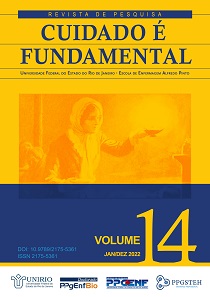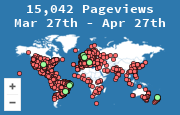Health repercussions of covid-19
perceptions of the elderly
DOI:
https://doi.org/10.9789/2175-5361.rpcfo.v14.11796Keywords:
Coronavirus infections, Health of the elderly, Social isolation, TechnologyAbstract
Objective: to reveal the perceptions of the elderly about the repercussions of COVID-19 on the elderly. Method: exploratory, descriptive study with a qualitative approach. Twenty elderly residents in Santa Catarina, Brazil participated in the study. Data collection took place through semi-structured questions, through video call on WhatsApp due to the pandemic. For the organization and analysis of data, content analysis was used. Results: two categories emerged: 1) Feelings of the elderly awakened in the face of COVID-19; 2) Experiences of the elderly in the pandemic context. Conclusion: the pandemic situation aroused feelings of sadness, loneliness, anxiety, homesickness and fear in the elderly, in addition to difficulties in adapting to isolation, in the face of physical distancing from family and friends, with interruption of leisure, work and physical activities. However, technologies were allies in maintaining contact with other people, despite the difficulties in handling.
Downloads
References
Marrocos EM, Freitas ASF, Carneiro GM, Pitombeira MGV. Percepção dos idosos sobre as repercussões da pandemia por COVID-19 em sua saúde. Res. Soc. Dev. [Internet]. 2021 [acesso em 02 de fevereiro de 2022];10(9). Disponível em: https://rsdjournal.org/index.php/rsd/article/view/18067/1629.
Silva ES, Barakat NJD, Taveira V. O idoso relacionado aos direitos humanos e a problemática do crescimento populacional e a promoção da saúde. Braz. Jour. Health Rev. [Internet]. 2021 [acesso em 11 de fevereiro de 2022];4(1). Disponível em: https://www.brazilianjournals.com/index.php/BJHR/article/view/23195/18627.
Organização Pan-Americana Da Saúde (OPAS). Década do envelhecimento saudável 2020-2030. [Internet]. 2020 [acesso em 11 de fevereiro de 2022]. Disponível em: https://iris.paho.org/bitstream/handle/10665.2/52902/OPASWBRAFPL20120_por.pdf?sequence=1&isAllowed=y.
Stobäus CD, Lira GA, Ribeiro KSQS. Elementos para um envelhecimento mais saudável através da promoção da saúde do idoso e educação popular. Estud. interdiscip. envelhec. [Internet]. 2018 [acesso em 11 de fevereiro de 2022];23(2). Disponível em: https://seer.ufrgs.br/RevEnvelhecer/article/view/47701.
Hammerschmidt KSA, Santana RF. Saúde do idoso em tempos de pandemia covid-19. Cogit. Enferm. [Internet]. 2020 [acesso em 11 de fevereiro de 2022];25(1). Disponível em: https://revistas.ufpr.br/cogitare/article/view/72849.
Malta DC, Szwarcwald CL, Barros MBA, Gomes CS, Machado ÍE, Souza Júnior PRB, et al. A pandemia da COVID-19 e as mudanças no estilo de vida dos brasileiros adultos: um estudo transversal, 2020. Epidemiol. Serv. Saúde [Internet]. 2020 [acesso em 11 de fevereiro de 2022];29(4). Disponível em: https://www.scielo.br/j/ress/a/VkvxmKYhw9djmrNBzHsvxrx/?lang=pt&format=html.
Naderifar M, Goli H, Ghaljaie F. Snowball Sampling: A Purposeful Method of Sampling in Qualitative. Research. Strides Dev. Med. Educ. [Internet]. 2017 [cited 2022 jan 21];14(3). Available from: http://sdme.kmu.ac.ir/article_90598_3632edfb2e97c38d73c0bdea8753195c.pdf.
Bardin L. Análise de Conteúdo. São Paulo: Edições 70; 2016.
Oliveira VV, Oliveira LV, Rocha MR, Leite IA, Lisboa RS, Andrade KCL. Impactos do isolamento social na saúde mental de idosos durante a pandemia pela Covid-19. Braz. Jour. Health Rev. [Internet]. 2021 [acesso em 03 de fevereiro de 2022];4(1). Disponível em: https://www.brazilianjournals.com/index.php/BJHR/article/view/25339/20220.
D’Avila LI, Rocha FC, Rios BRM, Pereira SGS, Piris AP. Processo Patológico do Transtorno de Ansiedade Segundo a Literatura Digital Disponível em Português: revisão integrativa. Rev. Psicol. Saúde. [Internet]. 2019 [acesso em 12 de fevereiro de 2022];12(2). Disponível em: https://pssaucdb.emnuvens.com.br/pssa/article/view/922/1106.
Silva JS, Uhlmann LAC. Florais de Bach para o Tratamento da Ansiedade. Braz. Jour. Development [Internet]. 2021 [acesso em 13 de fevereiro de 2022];7(6). Disponível em: https://www.brazilianjournals.com/index.php/BRJD/article/view/32059/pdf.
Possamai VD, Silva PC, Silva AW, SantHelena DP, Griebler EM, Vargas GG, et. al. Uma nova realidade: aulas remotas de atividade física para idosos na pandemia de Covid-19. Rev. Kairós-Gerontologia. [Internet]. 2020 [acesso em 03 de fevereiro de 2022];23(28). Disponível em: https://revistas.pucsp.br/kairos/article/view/50997.
Dourado SPC. A pandemia de COVID-19 e a conversão de idosos em “grupo de risco”. Cad. Campo. [Internet]. 2020 [acesso em 05 fevereiro de 2022];29(1). Disponível em: https://www.revistas.usp.br/cadernosdecampo/article/view/169970/162659.
Ministério da Saúde (BR). Secretaria de Vigilância em Saúde. Plano Nacional de Operacionalização da Vacina Contra a COVID-19 [Internet].12. ed. Brasília: Ministério da Saúde; 2022 [acesso em 05 de fevereiro de 2022]. Disponível em: https://www.gov.br/saude/pt-br/coronavirus/publicacoes-tecnicas/guias-e-planos/plano-nacional-de-operacionalizacao-da-vacinacao-contra-covid-19.pdf.
Almeida WS, Szwarcwald CL, Malta DC, Barros MBA, Souza Júnior PRB, Azevedo LO, et al. Mudanças nas condições socioeconômicas e de saúde dos brasileiros durante a pandemia de COVID-19. Rev. Bras. Epidemiol. [Internet]. 2020 [acesso em 05 de fevereiro de 2022];23. Disponível em: https://www.scielo.br/j/rbepid/a/w8HSZbzGgKCDFHmZ6w4gyQv/abstract/?lang=pt.
Silva MJS, Schraiber LB, Mota A. The concept of health in Collective Health: contributions from social and historical critique of scientific production. Physis. [Internet]. 2019 [cited 2022 fev 13];29(1). Available from: https://www.scielo.br/j/physis/a/7jH6HgCBkrmFm7RdwkNRHfm/?format=pdf&lang=en.
Velho FD, Herédia VBM. O idoso em quarentena e o impacto da tecnologia em sai vida. Rosa dos Ventos [Internet]. 2020 [acesso em 05 de fevereiro de 2022];12(3). Disponível em: http://ucs.br/etc/revistas/index.php/rosadosventos/article/view/8903.
Souza TDS, Ferreira FB, Bronze KM, Garcia RV, Rezende DF, Santos PR, et al. Mídias sociais e educação em saúde: o combate às fake news na pandemia da COVID-19. Enferm. Foco. [Internet]. 2020 [acesso em 11 de fevereiro de 2022];11(1). Disponível em: http://revista.cofen.gov.br/index.php/enfermagem/article/view/3579.
Costa DES, Rodrigues SA, Alves RCL, Silva MRF, Bezerra ADC, Santos DC, et al. A influência das tecnologias na saúde mental dos idosos em tempos de pandemia: uma revisão integrativa. Res. Soc. Dev. [Internet]. 2021 [acesso em 05 de fevereiro de 2022];10(2). Disponível em: https://rsdjournal.org/index.php/rsd/article/view/12198/10992.
Published
Versions
How to Cite
Issue
Section
License
Copyright (c) 2022 Revista de Pesquisa Cuidado é Fundamental Online

This work is licensed under a Creative Commons Attribution-NonCommercial-NoDerivatives 4.0 International License.
TRANSFER AGREEMENT COPYRIGHT I transfer copyright of the article to the Journal of Care Survey is Fundamental - Online - RPCF, so it is accepted due to electronic publishing. The copyright includes the right to reproduce in whole or in part by any means, distributing that article, including figures, photographs, and any translations. The author can also print and distribute copies of your article, stating that since the rights belong to RPCF. I declare that this manuscript is original and has not been submitted for publication, in whole or in part to other online journals or not, so BMMC in the Annals of scientific events or book chapters.






























